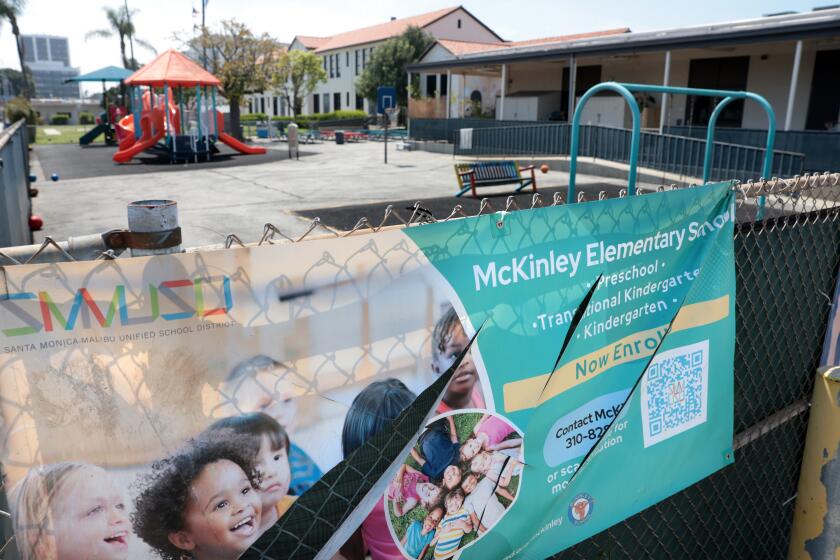From the Archives: UC Bans Dating of Faculty, Students
SAN FRANCISCO — Spurred by a scandal that toppled UC Berkeley’s law school dean last year, University of California regents on Thursday approved a policy prohibiting professors and other faculty from having romantic or sexual relationships with their students.
With the new policy, which takes effect immediately, the university joins a growing number of American higher educational institutions that have restricted such relationships, saying they may exploit students.
“Just having this on the books will help change whatever behavior is problematic,” said Gayle Binion, a UC Santa Barbara political science professor who heads the university-wide Academic Senate.
Binion, who helped draft the policy, said that while she believes most faculty members already recognize such standards of behavior, it was important for the university to take a clear stand.
![]()
“The very integrity of the university’s academic mission is dependent on the accountability of the faculty member as a mentor, educator and evaluator,” she said.
Until now, UC -- like many U.S. colleges -- has had no systemwide ban on faculty-student dating. But six campuses, including Berkeley, have conflict-of-interest guidelines urging professors to recuse themselves from overseeing students with whom they are romantically involved.
The regents approved the policy on a voice vote, with two of them -- Regent Velma Montoya and student Regent Matt Murray -- asking that their opposition be registered. They and other critics said the policy was too broad and would be difficult to enforce.
“This could be a legal nightmare,” Montoya said.
The potential problems stemming from sexual relations between professors and students were highlighted at the university last fall when the dean of the Boalt Hall law school announced his resignation after an allegation of sexual harassment by a former law student. The woman said that, when she was a student, John P. Dwyer fondled her after she passed out following a night of heavy drinking. Dwyer has said the encounter was consensual.
Regent Judith Hopkinson, who pushed for the policy change, said work on the proposal began in 2001 but gained momentum after the widely publicized episode. “We were all incredibly distressed by that incident,” she said.
The new policy says it is unacceptable for professors to enter into a romantic or sexual relationship with a student for whom they have “or should reasonably expect to have in the future” any teaching, evaluative or supervisory responsibility.
Such students, it says, would include those whose academic program requires them to enroll in a class taught by the professor as well as those known to the faculty member to “have an interest” in an academic subject within the professor’s area of expertise.
It would also require professors to recuse themselves from academic responsibility for students with whom the professors have an existing relationship.
Faculty members found to have violated the rules would be subject to disciplinary action, ranging from written censure to demotion or dismissal.
Hopkinson said she would have preferred an outright ban on relationships between faculty and undergraduate students, but she said she was satisfied with the compromise.
![]()
“It’s a huge step for the university,” she said.
Binion said she could not comment on specifics of the Boalt situation but said the new policy would clearly prohibit deans or department heads from dating students within their area of supervision.
Binion added that the situation is especially clear-cut regarding law school deans because they are typically asked to write letters attesting to the good character of graduates before students are allowed to take the state bar exam.
Regent Sherry L. Lansing applauded the new policy and called it “long overdue.”
Regulating consensual relationships between faculty and students is “an extraordinarily controversial issue,” she said. The regents’ action “shows we are taking a stand against the abuse of these relationships.”
But Murray, the student regent who is an undergraduate at UC Berkeley, said he opposed the policy for two reasons: He thought students had too little input in its development, and it went “too far” in regulating what he described as private relationships between consenting adults.
Nationally, colleges and universities have taken a variety of approaches to the issue, and the UC policy appears to strike a middle ground.
Increasingly, institutions are trying to limit such relationships, although only a few -- notably the College of William and Mary in Virginia -- have banned all sexual liaisons between professors and undergraduates, as well as graduate students under their supervisors.
Others have toughened their policies to require professors to give up supervisory or evaluative roles over students with whom they are involved, and to report such relationships to their own supervisors.
But many schools have vague policies or no explicit restrictions at all on consensual relationships between faculty and students.
UC officials said the policy applies only to faculty and student relations, but said they would be returning to the regents in the fall with a separate policy governing sexual relations between faculty and staff members, as well as staff and students.
More to Read
Start your day right
Sign up for Essential California for news, features and recommendations from the L.A. Times and beyond in your inbox six days a week.
You may occasionally receive promotional content from the Los Angeles Times.






